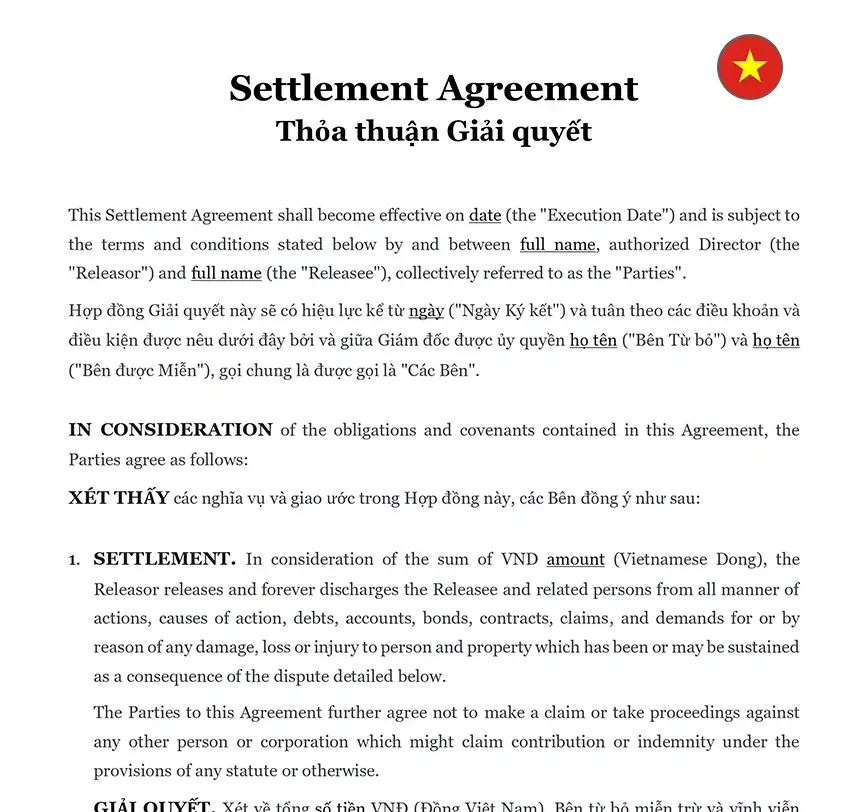Understanding Compromise Agreements
A compromise agreement is a legal tool used to resolve disputes by allowing the parties involved to reach a mutually acceptable solution. Unlike traditional litigation, which can be adversarial and often results in prolonged legal battles, a compromise agreement provides a collaborative framework for resolving conflicts. This type of agreement is particularly useful in various contexts, such as contractual disputes, employment issues, and other legal conflicts. By focusing on mutual concessions, a compromise agreement enables parties to settle their differences amicably and efficiently, often preserving relationships and reducing future conflicts. Draft clear compromise terms with our Settlement Agreement template for resolving disputes.
Key Benefits of Using Compromise Agreements
Compromise agreements offer several significant advantages, making them an appealing option for resolving disputes:
1. Cost-Effective
Engaging in litigation can be expensive due to legal fees, court costs, and other expenses. A compromise agreement can significantly reduce these costs by avoiding the need for a formal trial. The reduced financial burden allows parties to allocate resources more effectively, focusing on their core business or personal matters rather than on prolonged legal battles.
2. Time-Saving
Legal proceedings can take months or even years to conclude. A compromise agreement accelerates the resolution process, enabling parties to resolve their disputes more quickly. This efficiency is particularly beneficial for businesses looking to minimize disruptions and individuals who seek to resolve conflicts promptly.
3. Confidentiality
Unlike court cases, which are often public, a compromise agreement can include confidentiality clauses that keep the details of the dispute and its resolution private. This confidentiality helps protect the parties’ reputations and sensitive information from being disclosed to the public or competitors.
ℹ️ Read How to Protect Business Secrets with NDAs in Vietnam for managing confidentiality in disputes.
4. Control
A compromise agreement allows the parties to craft a resolution that addresses their specific needs and concerns. Unlike court decisions, which are imposed by a judge, a compromise agreement enables the parties to have greater control over the outcome, creating a solution that is tailored to their unique circumstances.
When to Consider a Compromise Agreement
Compromise agreements are suitable for a variety of situations where parties seek to resolve disputes without resorting to litigation. Consider using a compromise agreement in the following scenarios:
1. Contractual Disputes: When parties to a contract disagree on terms or performance, a compromise agreement can offer a practical solution. For instance, if there are disputes over the delivery of goods or services, the parties can negotiate terms that address their grievances and prevent further breaches.
2. Employment Issues: In cases of employment disputes, such as wrongful termination, discrimination, or wage disputes, a compromise agreement can help resolve conflicts amicably. Both employers and employees can benefit from reaching a settlement that addresses the issue without escalating to a formal legal claim.
3. Commercial Disagreements: For businesses experiencing disagreements over contract performance, service delivery, or other commercial matters, a compromise agreement can facilitate a resolution. By negotiating and agreeing on terms, businesses can avoid costly litigation and maintain positive business relationships.
Use Business Plan to outline strategies for handling disputes and compromise.
Drafting a Compromise Agreement
Drafting a compromise agreement requires careful attention to detail to ensure that all relevant aspects of the dispute are addressed. Key elements to include are:
| ➤ Parties Involved: Clearly list the names, addresses, and contact details of all parties involved in the dispute. This ensures that all parties are accurately identified and held accountable under the agreement. |
| ➤ Dispute Details: Provide a detailed description of the issue or conflict being resolved. This section should outline the nature of the dispute, including relevant facts, dates, and circumstances, to ensure clarity and mutual understanding. |
| ➤ Terms of Settlement: Specify the exact terms and conditions agreed upon by the parties. This may include obligations, deliverables, or changes to existing agreements, as well as timelines for implementation. |
| ➤ Compensation: Detail any financial or non-financial compensation agreed upon as part of the settlement. This might involve payments, refunds, or other forms of compensation, along with any conditions attached. |
| ➤ Confidentiality: Include clauses that address the confidentiality of the agreement and the dispute details. This helps protect sensitive information and ensures that the terms of the agreement remain private. |
| ➤ Signatures: Ensure that all parties sign the agreement to indicate their consent and commitment to the terms. Signature blocks should be provided for each party, along with the date of signing |











